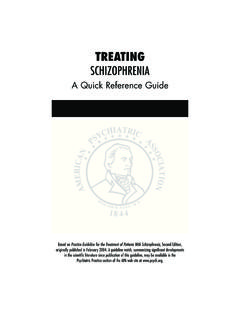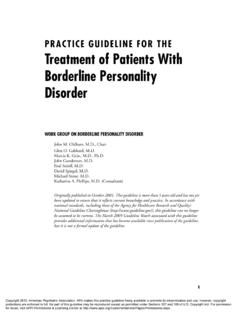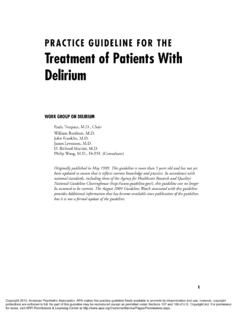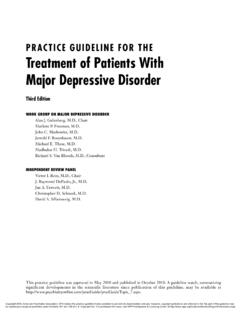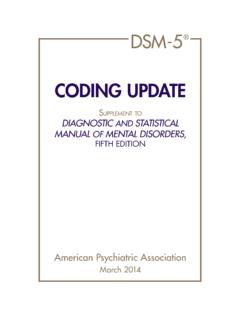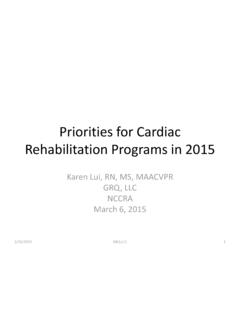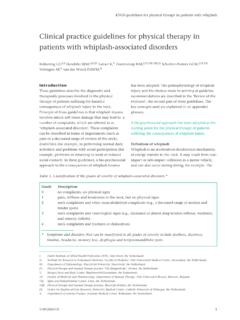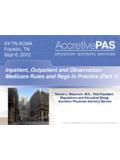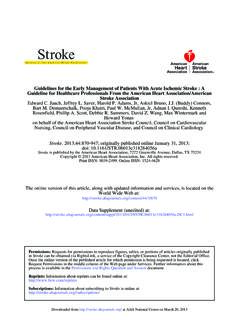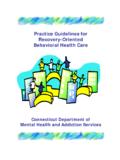Transcription of PRACTICE GUIDELINE FOR THE Treatment of Patients With ...
1 1 PRACTICE GUIDELINE FOR THE Treatment of Patients With substance Use DisordersSecond EditionWORK GROUP ON substance USE DISORDERSH erbert D. Kleber, , ChairRoger D. Weiss, , Vice-ChairRaymond F. Anton Jr., n y P. G e o r g e , M . D . Shelly F. Greenfield, , R. Kosten, P. O Brien, , J. Rounsaville, C. Strain, M. Ziedonis, Hennessy, (Consultant)Hilary Smith Connery, , (Consultant)This PRACTICE GUIDELINE was approved in December 2005 and published in August 2006. A GUIDELINE watch, summarizing significant developments in the scientific literature since publication of this GUIDELINE , may be available in the Psychiatric PRACTICE section of the APA web site at 2010, American Psychiatric Association. APA makes this PRACTICE GUIDELINE freely available to promote its dissemination and use; however, copyright protections are enforced in full.
2 No part of this GUIDELINE may be reproduced except as permitted under Sections 107 and 108 of Copyright Act. For permission for reuse, visit APPI Permissions & Licensing Center at PSYCHIATRIC ASSOCIATIONSTEERING COMMITTEE ON PRACTICE GUIDELINESJohn S. McIntyre, ,ChairSara C. Charles, ,Vice-ChairDaniel J. Anzia, A. Cook, T. Finnerty, R. Johnson, E. Nininger, Summergrad, M. Woods, , Yager, AND COMPONENT LIAISONSR obert Pyles, (Area I)C. Deborah Cross, (Area II)Roger Peele, (Area III)Daniel J. Anzia, (Area IV)John P. D. Shemo, (Area V)Lawrence Lurie, (Area VI)R. Dale Walker, (Area VII)Mary Ann Barnovitz, Hafter Gray, Saxena, Tonnu, Kunkle, , Senior Program ManagerAmy B. Albert, , Assistant Project ManagerLaura J. Fochtmann, , Medical EditorClaudia Hart, Director, Department of Quality Improvement and Psychiatric ServicesDarrel A.
3 Regier, , , Director, Division of ResearchCopyright 2010, American Psychiatric Association. APA makes this PRACTICE GUIDELINE freely available to promote its dissemination and use; however, copyright protections are enforced in full. No part of this GUIDELINE may be reproduced except as permitted under Sections 107 and 108 of Copyright Act. For permission for reuse, visit APPI Permissions & Licensing Center at of Patients With substance Use Disorders3 CONTENTSS tatement of Intent .. 5 Guide to Using This PRACTICE GUIDELINE .. 6 Development Process .. 7 Part A: Treatment Recommendations for Patients With substance Use Disorders .. Summary of Recommendations .. System .. Treatment Principles .. Use Disorders: Treatment Principles and Alternatives.. Use Disorders: Treatment Principles and Alternatives .. Use Disorders: Treatment Principles and Alternatives.
4 Use Disorders: Treatment Principles and Alternatives .. Use Disorders: Treatment Principles and Alternatives .. Treatment Principles .. of Treatment .. Settings .. Management .. Treatments .. Treatments .. Features Influencing Treatment .. and Confidentiality Issues .. of Nicotine Dependence .. Settings .. Approach to Treatment .. Treatments .. Treatments .. of Smokers on Smoke-Free Wards .. Features Influencing Treatment .. of Alcohol-Related Disorders .. Settings .. Treatments .. 91 Copyright 2010, American Psychiatric Association. APA makes this PRACTICE GUIDELINE freely available to promote its dissemination and use; however, copyright protections are enforced in full. No part of this GUIDELINE may be reproduced except as permitted under Sections 107 and 108 of Copyright Act.
5 For permission for reuse, visit APPI Permissions & Licensing Center at PRACTICE Treatments .. Features Influencing Treatment .. of Marijuana-Related Disorders .. Setting .. Treatments .. Treatments .. of Cocaine-Related Disorders .. Settings .. Treatments .. Treatments .. Features Influencing Treatment .. of Opioid-Related Disorders .. Settings .. Treatments .. Treatments .. Features Influencing Treatment .. 121 Part B: Background Information and Review of Available Evidence .. Definition, Natural History and Course, and Epidemiology .. Definition and Diagnostic Features.. History and Course .. and Synthesis of Available Evidence .. Dependence .. Disorders .. Disorders .. Disorders .. Disorders .. 164 Part C: Future Research Needs .. 178 Individuals and Organizations That Submitted Comments.
6 180 References .. 181 Copyright 2010, American Psychiatric Association. APA makes this PRACTICE GUIDELINE freely available to promote its dissemination and use; however, copyright protections are enforced in full. No part of this GUIDELINE may be reproduced except as permitted under Sections 107 and 108 of Copyright Act. For permission for reuse, visit APPI Permissions & Licensing Center at of Patients With substance Use Disorders5 STATEMENT OF INTENTThe American Psychiatric Association (APA) PRACTICE guidelines are not intended to be con-strued or to serve as a standard of medical care. Standards of medical care are determined onthe basis of all clinical data available for an individual patient and are subject to change as sci-entific knowledge and technology advance and PRACTICE patterns evolve. These parameters ofpractice should be considered guidelines only.
7 Adherence to them will not ensure a successfuloutcome for every individual, nor should they be interpreted as including all proper methodsof care or excluding other acceptable methods of care aimed at the same results. The ultimatejudgment regarding a particular clinical procedure or Treatment plan must be made by the psy-chiatrist in light of the clinical data presented by the patient and the diagnostic and treatmentoptions PRACTICE GUIDELINE has been developed by psychiatrists who are in active clinical prac-tice. In addition, some contributors are primarily involved in research or other academicendeavors. It is possible that through such activities some contributors, including work groupmembers and reviewers, have received income related to treatments discussed in this guide-line. A number of mechanisms are in place to minimize the potential for producing biasedrecommendations due to conflicts of interest.
8 Work group members are selected on the basisof their expertise and integrity. Any work group member or reviewer who has a potential con-flict of interest that may bias (or appear to bias) his or her work is asked to disclose this to theSteering Committee on PRACTICE guidelines and the work group. Iterative GUIDELINE drafts arereviewed by the Steering Committee, other experts, allied organizations, APA members, andthe APA Assembly and Board of Trustees; substantial revisions address or integrate the com-ments of these multiple reviewers. The development of the APA PRACTICE guidelines is notfinancially supported by any commercial detail about mechanisms in place to minimize bias is provided in a document avail-able from the APA Department of Quality Improvement and Psychiatric Services, APAG uideline Development Process.
9 This PRACTICE GUIDELINE was approved in December 2005 and published in August 2010, American Psychiatric Association. APA makes this PRACTICE GUIDELINE freely available to promote its dissemination and use; however, copyright protections are enforced in full. No part of this GUIDELINE may be reproduced except as permitted under Sections 107 and 108 of Copyright Act. For permission for reuse, visit APPI Permissions & Licensing Center at PRACTICE GuidelinesGUIDE TO USING THIS PRACTICE GUIDELINEThe PRACTICE GUIDELINE for the Treatment of Patients With substance Use Disorders, 2nd Edition,consists of three parts (A, B, and C) and many sections, not all of which will be equally usefulfor all readers. The following guide is designed to help readers find the sections that will bemost useful to A, Treatment Recommendations for Patients With substance Use Disorders, is pub-lished as a supplement to the American Journal of Psychiatry and contains general and specifictreatment recommendations.
10 Section I summarizes the key recommendations of the guidelineand codes each recommendation according to the degree of clinical confidence with which therecommendation is made. Section II, General Treatment Principles, provides a general dis-cussion of the formulation and implementation of a Treatment plan as it applies to the individ-ual patient. Section , Clinical Features Influencing Treatment , discusses a range of clinicalconsiderations that could alter the general recommendations discussed in Section I. SectionsIII, IV, V, VI, and VII provide specific recommendations for the Treatment of Patients with nic-otine-, alcohol-, marijuana-, cocaine-, and opioid-related disorders, B, Background Information and Review of Available Evidence, and Part C, FutureResearch Needs, are not included in the American Journal of Psychiatry supplement but are pro-vided with Part A in the complete GUIDELINE , which is available in print format from AmericanPsychiatric Publishing, Inc.

